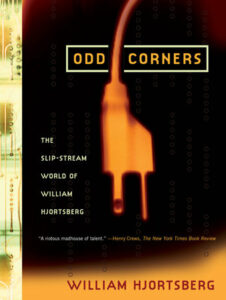William Hjortsberg
William Hjortsberg is the author of eight books, including Alp, Gray Matters, and Falling Angel, as well as the screenplays "Legend" and "Thunder & Lightning." He lives in Montana with his wife, painter Janie Camp.
Subscribe to our newsletter for news & events from Counterpoint Press.
Books
Odd Corners
The Slip-Stream World of William Hjortsberg
In 1971, when William Hjortsberg first published Gray Matters, reviewers mentioned Borges. And in 1972 came Symbiography, a novella about a man who dreams for a living. He is, in fact, a best–selling dreamer. Before "Mad Max" (1979) and Neuromancer (1984), back in the days when reality was either "real" or chemical, Hjortsberg sat about to create a post–holocaust fiction, (mis–termed, we think, "science" fiction), that anticipates the Virtual, the Punk, and the Meta. In The New York Times, John Leonard called him "a satanic S.J. Perelman . . . by way of Disney and de Sade," and Harry Crews, also in The Times, continued, "He writes fiction the way Leroy Jordan plays football—with controlled abandon—which is to say, with the abandon that only the greatest discipline can release."As readers it is thrilling to realize how perfectly timed this work is for our day, fresher even, somehow, than it was thirty years ago. Odd Corners collects Gray Matters and Symbiography together with two stories never before in book form, a complete cyberworld, courtesy of William Hjorstberg.
Jubilee Hitchhiker
The Life and Times of Richard Brautigan
Confident and robust, Jubilee Hitchhiker is an comprehensive biography of late novelist and poet Richard Brautigan, author of Troutfishing in America and A Confederate General from Big Sur, among many others. When Brautigan took his own life in September of 1984 his close friends and network of artists and writers were devastated though not entirely surprised. To many, Brautigan was shrouded in enigma, erratic and unpredictable in his habits and presentation. But his career was formidable, an inspiration to young writers like Hjortsberg trying to get their start. Brautigan's career wove its way through both the Beat–influenced San Francisco Renaissance in the 1950s and the "Flower Power" hippie movement of the 1960s; while he never claimed direct artistic involvement with either period, Jubilee Hitchhiker also delves deeply into the spirited times in which he lived.As Hjortsberg guides us through his search to uncover Brautigan as a man the reader is pulled deeply into the writer's world. Ultimately this is a work that seeks to connect the Brautigan known to his fans with the man who ended his life so abruptly in 1984 while revealing the close ties between his writing and the actual events of his life. Part history, part biography, and part memoir this etches the portrait of a man destroyed by his genius.

Catapult | Counterpoint | Soft Skull
20 Jay Street #704
Brooklyn, NY 11201
646.926.0805 | contact@catapult.co






